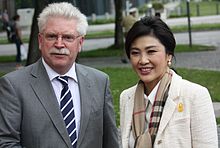Yingluck Shinawatra
[5] She then became an executive in the businesses founded by her elder brother, Thaksin Shinawatra and later became the president of property developer SC Asset and managing director of Advanced Info Service.
In May 2011, the Pheu Thai Party, which maintains close ties to Thaksin, nominated Yingluck as their candidate for Prime Minister in the 2011 election.
[6][7] She campaigned on a platform of national reconciliation, poverty eradication, and corporate income tax reduction and won a landslide victory.
After mass protests against her government in late 2013, she asked for a dissolution of parliament on 9 December 2013, triggering a snap election, but continued to act as caretaker prime minister.
The court found her guilty of charges of abuse of power over the removal of national security chief Thawil Pliensri in 2011.
[14] Her paternal family is of Hakka Chinese origin, descending from Seng Saekhu (her great-grandfather) who immigrated from Fengshun, Guangdong, to Siam in the 1860s, becoming a tax farmer in Chiang Mai.
She was investigated by Thailand's Securities and Exchange Commission regarding possible insider trading after she sold shares of her AIS stock for a profit prior to the sale of the Shin Corporation to Temasek Holdings.
The military junta-appointed Assets Examination Committee charged that Yingluck made up false transactions and that "there were no real payments for each Ample Rich Co., Ltd shares sold" and "the transactions were made at a cost basis of par value in order to avoid income taxes, and all the dividends paid out by Shin to those people were transferred to [her sister-in-law] Potjaman's bank accounts".
US diplomatic cables leaked in 2011 revealed that during a 9 September 2009 meeting, former Deputy Prime Minister and "close Thaksin ally" Sompong Amornwiwat told Ambassador to Thailand Eric John that she did not envision a big role for Yingluck in the Pheu Thai Party, and that "Thaksin himself was not eager to raise her profile within the party, and was more focused on finding ways to keep his own hand active in politics."
The cable cited Yingluck saying that, "Someone could easily emerge relatively late in the game to take the reins of the party and serve as the next Prime Minister.
The front runners were Yingluck and Mingkwan Saengsuwan, who had led the opposition in an unsuccessful motion of no confidence against the Democrat Party-led coalition government.
She promised to empower the Independent Truth and Reconciliation Commission of Thailand (ITRC), the panel that the Democrat-led government had set up to investigate the killings.
[28] Yingluck also proposed a general amnesty for all major politically motivated incidents that had taken place since the 2006 coup, which could include the coup itself, court rulings banning Thai Rak Thai and People's Power Party leaders from seeking office, the People's Alliance for Democracy (PAD) seizures of Government House and Don Muang and Suvarnabhumi Airports, the military crackdowns of 2009 and 2010, and the conviction of Thaksin Shinawatra for abuse of power.
However, Yingluck denied that the return of seized assets was a priority for the Pheu Thai party, and repeated that she had no intention of giving amnesty to any one person.
Her agricultural policies included improving operating cashflow to farmers and providing loans of up to 70 per cent of expected income, based on a guaranteed rice price of 15,000 baht per tonne.
[34][citation needed] Exit polls indicated a landslide victory, with Pheu Thai projected to win as many as 310 seats in the 500-seat parliament.
[36] There were 3 million invalid ballots; the large number was cited as the cause for the difference between the exit poll results and the official count.
United Nations secretary-general Ban Ki-moon welcomed the outcome of the elections and called for all parties to "respect the will of the Thai people as expressed through the democratic process."
Aung San Su Kyi congratulated Yingluck, praised the election as "free and fair", and said that she expected "the ties between Myanmar and Thailand to get better.
[40][41] Outgoing Defense Minister General Prawit Wongsuwan said that he accepted the election results, and after having talked with military leaders, would not intervene.
[42] Following the general election, the first separate session of the House of Representatives was held in the morning of 5 August to select a new Prime Minister.
[44][45] Somsak Kiatsuranont, President of the National Assembly, advised and consented King Bhumibol Adulyadej to appoint Yingluck Prime Minister on 8 August.
[60][61] Especially noted was the choice of Nalinee Taveesin (Minister in the PM's Office), who is on a US blacklist for alleged business links to Zimbabwean President Robert Mugabe,[62][63][64] and Nattawut Saikua (Deputy Minister of Agriculture), the first leader of the United Front for Democracy Against Dictatorship (UDD, or "Red Shirts") in the government.
[70] On 7 May 2014, the Constitutional Court unanimously dismissed Yingluck from office in consequence of her removing an appointee of an earlier government, Thawil Pliensri, from his post as National Security Council secretary-general in 2011.
[73] On 8 May 2014, the National Anti-Corruption Commission (NACC) unanimously agreed to indict Yingluck in the rice-pledging scheme corruption case citing millions of rice farmers who remain unpaid.
[74][75][76] On 28 November, Thailand's National Legislative Assembly (NLA) denied the addition of 72 pieces of evidence to her rice-pledging case.
[80] On 27 September 2017, in her absence, she was found guilty of dereliction of duty over the rice subsidy scheme and was sentenced to five years in prison.
[86] On 25 April 2024, the National Anti-Corruption Commission (NACC) unanimously opted against challenging the Supreme Court's decision to dismiss the corruption charges levied against former Prime Minister Yingluck Shinawatra and to revoke the warrant for her arrest.
Her goals included improvement of trade relations and increased export business investments, and studying water resources management.








